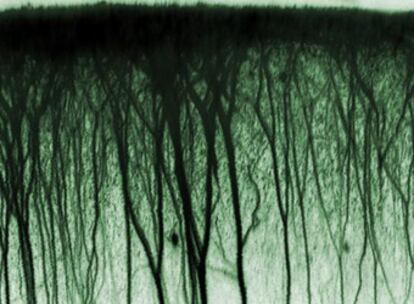Lesson from neurons: don't experience tomorrow what you can experience today
Understanding neuronal mechanisms underlying brain function and development represents a central challenge in neuroscience research field. Experience occurring in the first years of life are crucial for a correct and psychological growth of the brain, and the impact of early physical and social interactions in childhood has been proposed to influence brain development and adult behavior, that is "Don't leave for tomorrow what you can do today".
We are starting to elucidate how brain functions can be shaped by specific stimuli, studying how this important and complex organ works.
We know that the brain is built up out of circuits composed of cells called neurons. Each neuron can project long branches to many other neurons, where it forms contacts at specialised areas called synapses. At these sites, neurons 'speak' to each other by transmitting electrical signals. It is estimated that there are billions of neurons in the human brain and trillions of such contacts. Countless electrical signals are moving around the brain at any given time, and from these intricate signals the amazing ability of the brain to perform complex functions emerges.
It has been shown that the electrical activity of neurons and their connectivity can be shaped by interactions with the world around us?our external environment. Indeed, our brain is highly plastic and is able to modify the number of neurons, the organisation of their networks and their function upon specific stimulation.
In particular, early life experiences can have a significant long-term impact on brain structure and function. However, the problems is that we don't know how it is achieved yet. Depending on when and where neuronal changes in response to specific stimulation occur, brain maturation and adult behaviour can be differentially affected. Interestingly, some aspects of behaviour can be acquired only during a sensitive critical period, whereas the emergence of other behaviours is not dependent on experiences at particular point in development.
In my laboratory at the Physiology and Pharmacology Department of University of Rome - La Sapienza, we study how specific types of stimulation affect the strength of neuronal connections. We measure in rodents the very small electric signals flowing between neurons in specific brain regions devoted to learning and memory. Using this approach, we investigate how neuronal activity can be modulated by internal substances (like those released from immune system) or external materials (like chemicals), and how and when the external environment impacts specific brain activities.
For example, in the past few years, experiments performed on animals have indicated that rodents that spend their early life in an enriched environment where complex social and inanimate interactions are present show behavioural and structural alterations in their brains as adults compared with animal raised in a normal environment. Indeed, animals raised in such an environment show more complex neuronal circuits and the formation of neurons increases in particular areas of the brain involved in learning and memory. These new neurons can migrate within the specific brain region and integrate into existing circuits, thereby increasing the total number of neuronal contacts. Interestingly, these modifications produced by a environments with a lot of stimuli, correlate with an increased memory and learning activity. On the other hand, experiences of deprivation early in the life of rodents, such as emotional deprivation or stress treatment, impair brain development and increase adult anxiety-related behaviour. Later in life, if the same environmental stimulation or deprivation is experienced, it does not produce significant changes, indicating that the brain is more susceptible to environmental influences during development.
The goal of scientific research in this field is to identify the specific time window where brain development is most susceptible to the external environment, as well as the mechanisms underlying the modifications that take place and the impact that such changes could have on adult behaviour. Studies on animals will help us to fathom the impact of early life experiences in us. Understanding how influences on neuronal activity during development shape adult neuronal circuits will shed light on how early environmental experiences can modulate behaviour or increase susceptibility to mental disorders in human beings.
Thus, lesson is that balanced and positive relationships are key to the healthy development of the brain. The architecture that forms in early life provides the foundation for future learning, behaviour and health. These experiences need to be made early?today, yesterday, but not tomorrow. ?ç
Laura Maggi, University of Rome - La Sapienza. www.atomiumculture.eu

Tu suscripción se está usando en otro dispositivo
¿Quieres añadir otro usuario a tu suscripción?
Si continúas leyendo en este dispositivo, no se podrá leer en el otro.
FlechaTu suscripción se está usando en otro dispositivo y solo puedes acceder a EL PAÍS desde un dispositivo a la vez.
Si quieres compartir tu cuenta, cambia tu suscripción a la modalidad Premium, así podrás añadir otro usuario. Cada uno accederá con su propia cuenta de email, lo que os permitirá personalizar vuestra experiencia en EL PAÍS.
¿Tienes una suscripción de empresa? Accede aquí para contratar más cuentas.
En el caso de no saber quién está usando tu cuenta, te recomendamos cambiar tu contraseña aquí.
Si decides continuar compartiendo tu cuenta, este mensaje se mostrará en tu dispositivo y en el de la otra persona que está usando tu cuenta de forma indefinida, afectando a tu experiencia de lectura. Puedes consultar aquí los términos y condiciones de la suscripción digital.




























































